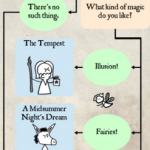I want to kick off the Sondheim Symposium this week with a guest post by Gilbert of The Last Conformer. He originally wrote it as a comment on the original post, but I like starting off the conversation by discussing something omitted, plus I want to reply to it tomorrow. I’m in italics, everything that follows is his. Oh, and I’m to blame for the stealing the post title from a different musical, I couldn’t let Eve Tushnet have all the fun.
Take it away, Gilbert!

As an entry point to my rant, children basically don’t feature in Company. And I don’t just mean none appear on stage (I wouldn’t advocate child-labor), they seem to be very distant even in theory. When Robert visits Jenny and David they mention in passing they need to keep quiet so as not to awake the kids. For Peter and Susan the kids are one of several reasons why they can’t live separate lives post-divorce. There are a few mentions of children in the songs but basically as nag-scapegoats, babysitting objects or jokes. And as far as I remember that’s it for a two-hour musical about marriage. Effectively children seem like a peripheral aspect of what boring people do when they settle down, but never as anything to be thought about when considering marriage.
Even aside of my reactionary Catholic views on the relationship of marriage and children I think this is symptomatic. Some other joint project might take the place of children e.g. if a couple turns out infertile. And I understand how one could see that as an equally good option rather than a substitute.
But in Company there is no trace of that either. Marriage is presented as being about what the title says: company. And then the difference to friendship is basically just intensity. In “Marry Me a Little” Robert wants that company to be shallow and cheap. At the end in “Being Alive” he wants it to involve a deeper investment of self, a commitment, an effect on his self-definition, and the vulnerability that goes along with that. If we take the scene before, with his looking for someone to take care of, he may even have realized it’s in part about sacrifice. I suppose that’s progress. But ultimately it’s still just a change in how much of the same he wants. His idea of marriage is still about two people looking at each other with no trace of looking at anything else together. There’s no room for marriage as an institution in this view, because making it so strictly about two people basically excludes any outside interest by definition. And it gets worse: If marriage differs from friendship mainly in intensity, friendship becomes an inferior good. So the reality-branch in which Robert gains a “true” marital intention is the branch in which he jilts his friends at the surprise party. Basically Robert’s progress is from solipsism to duopsism and that’s just not far enough.
Of course this post-modern view of marriage is particularly easy to fall into in a world where marriage no longer involves a phase-change in behavior. April’s butterfly story probably still includes some awareness that casual sex is hurtful, but ultimately in the musical as in the real world it’s assumed an unquestionable given. Which makes sense in a perverse way, because if marriage isn’t really a thing the difference between married and unmarried isn’t either.
Comparative sanity gets a two-minute hearing, but it never rises to Robert’s attention and doesn’t even get a song. As with the butterfly story, it’s subtle enough to not offend the hippies. I’m talking, of course, of Kathy in the park. She’s wasn’t necessarily always aware of being out of place in New York (as she says, there’s a time to come to New York and a time to leave) but she has matured and realized it’s wrong. I think Musical!New York is basically Marta’s vision of it, so returning to Cape Cod is a rejection of a world-view. Going back to Cape Cod in order to marry is basically rejecting the shallow variant that passes for marriage in New York.
There is a bitter note in her evading the question whether she loves the guy she will marry. But I still would have more hope for her marriage than for Robert’s. Of course it’s normally not a particularly good idea to marry without romantic spark. But still, love is primarily a virtue and only secondarily an emotion. With work and character-building the emotion may be producible in the long term, as it was in arranged marriages of old. The emotion is much less effective at inducing the virtue, and without the latter the former will die off in the long term. Also, I’m over-interpreting now, but maybe Kathy wants Robert to make her the kind of offer he made to Amy. And it’s telling he won’t make it to her despite the setup making it look like he would end up with her before she drops the bomb. Kathy just means something different when she talks of marriage than Robert does. And she is getting closer to the truth, while Robert just digs deeper.











